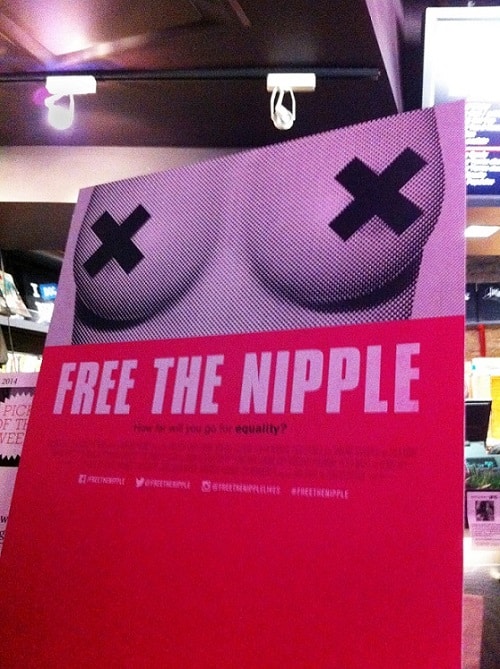Free the Nipple & Why we’re talking about nipples when there are way bigger problems in society
In the spring 2015 issue of Bitch magazine (a feminist publication), there’s a review of the Free the Nipple movie. Like many other reviews of this film, it questioned some implausible plot points and “bad writing.”
But that’s not all. The author of the article, A.A.I., starts off by dismissing Free the Nipple as a cause worthy of our attention.
She wrote that while she found it “totally unreasonable” that women can’t go topfree wherever men can, “…it’s unfortunate that Lina Esco’s directorial debut, Free the Nipple, which attempts to champion the power of grassroots activism, has to focus on an issue that is of so little consequence when compared with the violence, poverty and injustice that many face on a daily basis.”

Yeah, why are we talking about nipples when there’s homelessness and police brutality and starving children in 3rd world countries…right?
This line of thinking is so common it has a name — the “Fallacy of Relative Privation.” It’s the argument that since issue “A” is more important than issue “B”, we should therefore forget about “B” entirely and focus on “A” instead.
It’s called a “fallacy” because the argument lacks validity. It’s a thoughtless way of trying to shut down a discussion about a certain topic or issue.
People, including feminists, try to use this argument all the time when it comes to topfree equality. I’ve been a subscriber to Bitch for some time now and while I still think they do great work, I was surprised and disappointed to see this obtuse way of thinking coming from a well-respected feminist publication.
So let’s talk about what’s wrong with the fallacy and why topfree equality and Free the Nipple do matter.
You could apply the fallacy argument to any kind of social issue (feminist or other).
Anyone could argue that sexist dress codes in schools are not as important of an issue as domestic violence against women. Or that women’s representation in the media is not as important as ending female genital mutilation.
But herein lie the false assumptions — that there is some objectively determined hierarchy of feminist issues. And that to bring about change, we have to address certain issues in a chronological order one by one and only when one issue has been remedied can we move on to the next.
The reality is that many people care about or are invested in different causes simultaneously. There is no real or set hierarchy. When people talk about topfree equality, no one is saying that it’s the most important issue facing women right now or that we need to ignore all other causes to achieve it. The reality is that we can all care about small and large issues at the same time.
The other problem with the hierarchy approach is that it assumes that problem A and problem B are mutually exclusive and not connected. But equality issues are oftentimes connected, even when they don’t seem to be.
In the case of topfreedom, it shouldn’t be difficult to see the direct connection this issue has to sexual objectification, street harassment, slut-shaming, issues around public breastfeeding, and how it’s part of a long history of society’s attempt to police women’s bodies and sexuality.
To give women the right to go topfree in public is a powerful statement. It means desexualizing the female body and viewing women as human beings rather than sex objects. It means giving women autonomy over their own bodies as well as their sexuality and how they choose to express it.
It means deconstructing traditional patriarchal gender roles that say women must be modest and chaste. Topfree equality means challenging the idea that a woman’s state of dress or undress determines her consent, sexuality or even her value as a person.
The Free the Nipple movie may have done a less than stellar job of conveying these ideas, but that is no reason to dismiss its entire campaign or message.
Anyone who believes in equality should know that there is value in fighting inequality on every level. One can make a difference in fighting for whatever cause(s) they are passionate about. There is plenty of room for everyone, especially at the gender equality table.
Even if you don’t feel drawn to the cause of topfree equality or don’t care to go topless in public yourself, ever, you can still join the discussion without dismissing others’ ideas, thoughts and feelings.
Free the Nipple also touches upon a variety of other issues. Anyone can use it as a starting point for launching their own discussions about equality.
This article about Free the Nipple and the Fallacy of Relative Privation was published by Felicity’s Blog.



